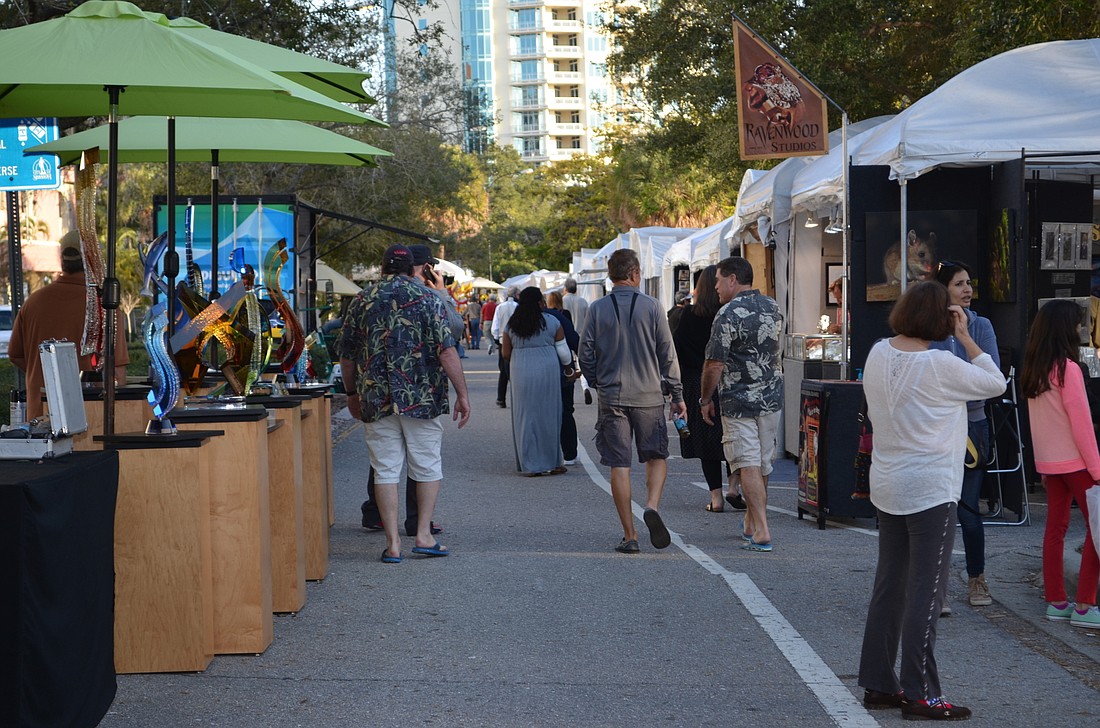- April 19, 2024
-
-
Loading

Loading

On Aug. 21, the City Commission approved a temporary yearlong moratorium on special events that close Main Street between Orange Avenue and Gulfstream Avenue.
That marks the fourth consecutive year the city adopted a one-year ban on events in this portion of Main Street, all of which were described as “temporary” measures. Documents for the Aug. 21 commission meeting said “concern over how to facilitate traffic circulation and parking downtown amid all the construction” inspired the moratorium.
But in June 2014, when the commission adopted the first moratorium, the construction of the State Street parking garage — and the loss of 139 parking spaces in a public lot — was cited as a major impetus. The city finished the State Street garage in summer 2015, adding 395 spaces to the downtown area.
Although construction is ongoing throughout downtown, some businesses and officials see no need to keep renewing the moratorium on Main Street events.
“It should go back to the old way,” said Ron Soto, chairman of the Sarasota Downtown Merchants Association. “Get signatures and let the people who are on Main Street with those businesses decide whether to close the street.”
Throughout the rest of downtown, the city requires that two-thirds of affected businesses approve any street closure. At the Aug. 21 meeting, Commissioner Hagen Brody said he didn’t think the city should treat the Orange to Gulfstream segment of Main Street any differently.
“This community wants events downtown,” Brody said. “To basically sector off this one portion of Main Street and say that we can’t have events here — this is a solution without a problem.”
City Manager Tom Barwin said construction remains a concern among some businesses. But Debbie Perez, the city’s auditoriums manager, said staff wanted to extend the moratorium to allow additional time to draft a more refined special events policy.
Already, she said, organizers have expressed interest in holding two downtown events on back-to-back weekends in February. She hoped new regulations could help better manage the scheduling of events, particularly during season.
“I want the opportunity to look into and come up with an internal policy before we open the floodgates again and open Main Street back up,” Perez said.
“This is a solution without a problem.” — Hagen Brody
The city has tried to adopt new special events policies in the recent past. In 2016, staff proposed a tiered permitting system based on event size, noise, street closures, alcohol sales and other factors. The commission chose not to adopt that kind of stratified system.
Mayor Shelli Freeland Eddie has said she wants to see a process that gives the city more discretion in picking which events can go downtown. City Attorney Robert Fournier said that’s a legally tricky proposition, and that a more objective permitting process is likely necessary to avoid any challenges from prospective event organizers.
“It can’t just be based on a preference for the event, because of an interest or lack of interest in the subject matter,” Fournier said.
Soto said it would be difficult to draft an ordinance based on the broad desires of downtown businesses, because those businesses have different interests. The owner of a gallery might oppose a craft fair but support a food-centric event. A restaurant owner could feel the opposite way.
“Whether it’s going to be motorcycles, an art show, a seafood festival — it doesn’t matter,” Soto said. “It’s going to be good for some and bad for others. So the big question is: What’s good for the majority?”
Soto suggested the city shouldn’t attempt to thread that needle, instead allowing the signature system to sort out which events did and didn’t have wide support from merchants.
“The big question is: What’s good for the majority?” — Ron Soto
Not everyone thinks Main Street is ready to take on special events again, though. Louise Converse, owner of Artisan Cheese Co., said the ongoing construction is still a major obstacle for doing business downtown.
Converse suggested the city could use a segment of Gulfstream Avenue to host special events. As for bringing events back to Main? She’d like to see officials hold off.
“I think they need to get the construction under control and then make that happen,” Converse said.
Other Main Street businesses would welcome the return of special events without any additional restrictions.
“It brings more foot traffic,” said Al Liew, owner of sushi restaurant Wild Ginger. “Any event is good.”
Perez said it would likely take at least four months before she could substantively dig into the regulations, because the city is still working to fill two vacancies in the special events office. Although the commission expressed a desire to revisit the subject as soon as possible, the board also felt another one-year moratorium wouldn’t negatively affect downtown.
After all, the rest of downtown remains fair game for any events.
“I think we need a set policy, and I don’t think that leaving this (moratorium) in place for one more year is going to keep anybody from having an event,” Commissioner Liz Alpert said.